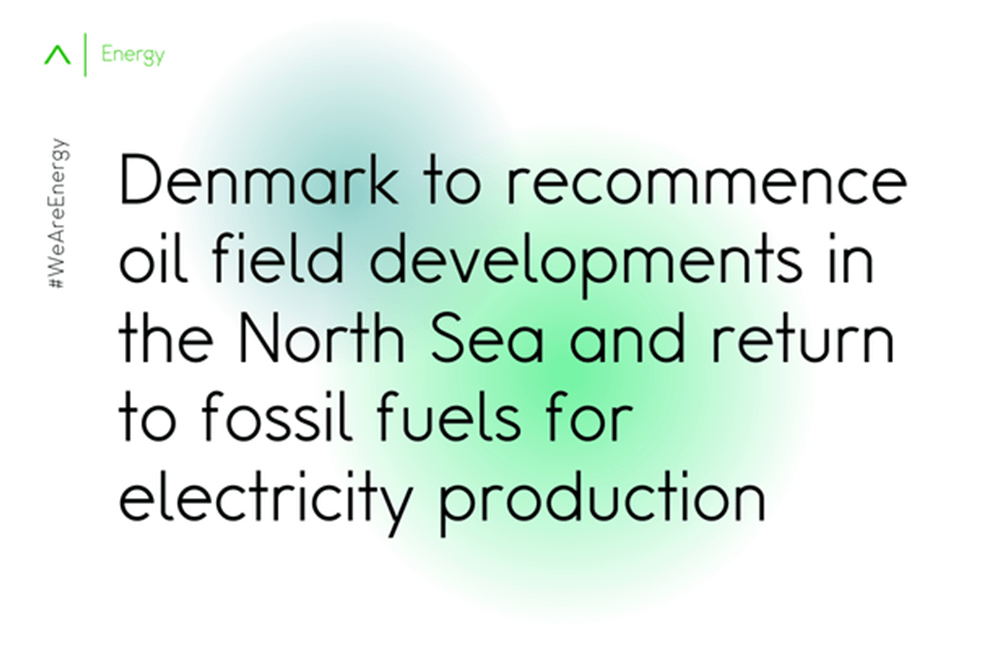Denmark to recommence oil field developments in the North Sea and return to fossil fuels for electricity production
11 Nov, 202210 minsDenmark originally began the extraction of oil, and then gas from the North Sea in 1972, wit...

Denmark originally began the extraction of oil, and then gas from the North Sea in 1972, with respective peaks in 2004 for oil and 2005 for gas. However, output started to decline, and the country was due to cease all North Sea oil exploration by 2050 with no new exploration licences being granted in the interim. The country has since become a net oil importer since 2018. Tyra, Denmark’s largest gas field, is not expected to resume production until 2023.
However, Gazprom, the Russian state company, ended the provision of gas to the Danish energy group Ørsted, in May 2022. As a result of the response by Western nations of sanctions against the Kremlin following its rather irrational invasion of Ukraine, Russia in turn retaliated with a reduction in the supply of natural gas to Europe.
Russia has significantly reduced the supply of its natural gas to Europe following the imposition of sanctions on the Kremlin by Western nations because of the country’s unprovoked invasion of Ukraine. There were also a series of “unexplained” leaks that affected the stream of gas to Europe from Russia via the Baltic Sea where the Nord Stream 1 and 2 pipelines suffered “mysterious” malfunctions.
A return to fossil fuels
Despite attending the COP26 climate summit in 2021 and agreeing with Costa Rica to end oil and gas production, Denmark has since announced that despite its move away from fossil fuels it will be producing once again. This, despite being a policy U-turn for Denmark, is because of the urgent need to find alternative gas supplies to replace those from Russia. The country will be working with UK petrochemicals group Ineos to once again develop a new oil and gas field in Denmark.
Coincident with the energy crisis and the onset of Winter, Ørsted – whose largest stakeholder is the Danish State itself - is to continue or plan to resume its operations at three fossil fuel-burning plants. While many oppose using fossil fuels, to maintain the electricity required for the country, the Danish government has instructed Ørsted they must continue, and, where required, resume production of electricity using coal- and oil-fired power stations.
According to Ørsted, the three power stations concerned are the coal-burning unit 3 at Esbjerg Power Station and unit 4 at Studstrup Power Station and the oil-burning unit 21 at Kyndby Peak Load Plant.
The three power stations concerned will require maintenance to be carried out to ensure they are ready to come online. Studstrup and Kyndby have already been decommissioned, with Esbjerg due to be decommissioned at the end of March 2023. They will also require specialised staff to operate and maintain them once they are again producing electricity. There has been a Danish government order to run the units until at least the end of June 2024.
There are better times ahead
However, it’s not all doom and gloom. While, in very simple terms, this response by Denmark to the energy supply crisis is to ensure Denmark has the electricity it needs to power business and consumer needs.
Despite this major fossil-fuel blip, Ørsted, is otherwise very active in wind power. It has set itself a target of becoming carbon neutral by the year 2025, a target which it will return to in earnest as soon as the current political situation allows it to do so. All things considered, Ørsted fully recognises that society, in general, has an urgent requirement to phase out and work towards eliminating the use of coal, gas and oil to produce energy. It similarly recognises that with Europe being in the midst of an enforced energy crisis, it sadly has no option but to return to burning fossil fuels to ensure it can provide an uninterrupted electricity supply to the best of its ability for Danish citizens.
It's not just Denmark
Just before the Danish announcement to recommission its oil and coal-burning power stations, RWE of Germany, another European energy giant, reported that three of its lignite (soft, brown, sedimentary rock from naturally compressed peat) electricity-producing plants would have to “temporarily return to producing electricity”. This is to preserve gas and ensure the supply of electricity to Germany. The arrangement is in place initially until the end of June 2023.


